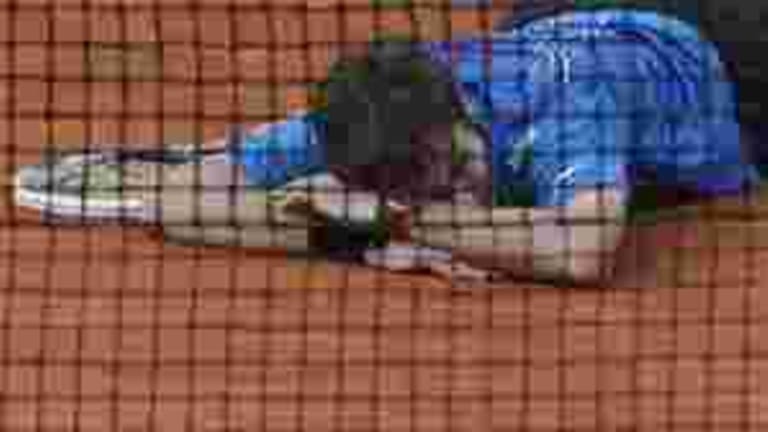There was a moment on Friday, when the camera in Court Suzanne Lenglen panned to Gael Monfils’ father, who was sitting forward and urging his son on from the first row, when I was struck by an overwhelming sense of déjà vu. Thirty-year-old déjà vu, to be exact. The sight of papa Monfils took me back to an image in my head of Yannick Noah’s father from 1983. He was also leaning forward in the first row at Roland Garros, watching his son become the only Frenchman in the Open era to win the title there.
But that winning image, and the sense of possibility that came with it, didn't stay with me for long today. In '83, Noah's father had ended up on the court, locked in a triumphant embrace with Yannick. This afternoon Monfils’ dad finished his son's match sitting back, his arms in his lap, watching helplessly with the rest of the audience as Gael staggered to defeat in five sets to Tommy Robredo. Like everyone else in Lenglen, he was left to wonder, “What if?”
What if Monfils had been able to convert one of his four match points? Could he have matched Noah's run to the Coupe des Mousquetaires? Probably not—Monfils was unseeded and already over-tennised, and players like Roger Federer, Novak Djokovic, or Rafael Nadal would almost surely have stood in his way. But seeing the father cheer on his son, it felt to me for a second, a split-second, as if French history could repeat itself.
Unfortunately, Monfils left us with what he has always left us: What-ifs. The 26-year-old’s pro career, which began nine years ago, has been one long string of them. For example:
What if he handled his nerves better, and grew bolder, rather than more timid, at the crucial moment? On those match points today, Monfils let the ball float and bounce, and he eventually lost them. In the next game, when he felt less pressure, he cut two of them off for easy winning volleys.
What if Monfils’ footwork were better, if he didn’t, as John McEnroe pointed out today, so often forego the traditional shuffle-step in favor of simply turning and running after the ball? He might be in better position, with better balance, on more of his shots.
What if he didn’t huff and puff and expend so much energy? What if he didn’t try so many acrobatic maneuvers, which have made him more injury-prone than he otherwise would have been? We might not have to say, as so many of us say when he makes his return to the tour, “Win or lose, it’s great to have Gael Monfils back.”
What if he had found a coach somewhere along the line who had convinced him to alter his game, to use more of his many skills? Other than his father, Monfils is coachless at the moment. That's hardly surprising: Would you want to go through matches like today’s every week of the year, living and dying on Monfils’ next shot, next decision?
Most important, perhaps, what if he had a killer’s instinct rather than a showman’s?
Then there’s the “what if” that’s always in the back of my mind when I watch La Monf strut his stuff on the tennis stage, and expand the possibilities of the game with his elastic talents: What if Gael Monfils had become a No. 1 player, a Grand Slam champion? It’s hard to believe he wouldn’t have transformed the sport in some way, and brought new audiences to it around the world.
What-ifs, by definition, will never come true, and we can only take what a player is able to give us. More important, a Gael Monfils who was ranked No. 1 in the world wouldn't be the same one we occasionally cringe at today. If we love to watch him—and not all of us do—we love him in part because of his flaws. We love the daredevil, not-worth-it acrobatics, the illogical, whiplash-inducing reversals of momentum, the mysterious ebbs and flows in his stamina. We love the player who gets ready to return serve by leaning straight down and resting his elbows on his knees, who wastes energy with useless first-set celebrations, who double-faults on four straight match points, who hugs his opponents in victory and defeat as if all that mattered was putting on, as he likes to say, “the most beautiful entertainment” for the crowd.
We love Monfils the performer, maybe more than the player, because he seems to love to perform at tennis as much as he does to win at it. And I'm guessing many root for him because they know he’s not a killer at heart. Before Monfils walked out to serve for the match at 5-4 in the fourth set today, a commentator for Eurosport said, “We’ll be afraid to watch.” I don’t think anyone else but Gael Monfils, at Roland Garros, could inspire those words.
“What if,” Monfils was asked after today’s match, he had done something different on those match points.
“No regrets,” he answered at first. Nobody really believed him, so he was asked the same question again.
“Well...” he admitted after a pause, “...maybe that forehand along the line, which was too long. But I took a chance.”
